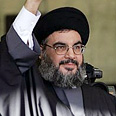
Lebanese cleric: Nasrallah eyeing presidency
Lebanese Mufti claims political happenings in Lebanon constitute war between Islamic sects: 'Everyone will learn that Iran is trying to meddle in the entire Arab world'. Druze leader Jumblatt: 'We will never surrender to Hizbullah'
"How else can we interpret the political high-jacking that Hizbullah ministers resorted to when they resigned from the government? Why is the minority trying to force itself onto the majority?" asks the sheikh, "who is behind the ethnic agendas which are presented as national ones while they turn tables and act to create confusion and chaos in the country?"
Al-Jozo added: "We cannot accept one of Lebanon's ethnic groups ruling solo. The resignation of the ministers is of an ethnic nature and that is very serious. Can Nasrallah's words be translated to mean he has the power to stage a coup in this country? Everyone will discover that Iran is trying to meddle in the Arab world as a whole. Why do some wish to drag us into a blind civil war in accordance with their ethnic agendas?"
Hizbullah: Elections and a new gov't
Meanwhile, Hizbullah continues to hold their cards close to their chests when it comes to the next move. Hizbullah party chairman in the Lebanese parliament, Muhammad Raad, told the Hizbullah radio station 'Nur' that the opposition intends to take creative steps, as it surprised the political arena with the resignation of its ministers. "Everything is on the table, and the actions of the people will come at the time and place where they will realize the long awaited for goal."
Fellow party member Tarrad Hamadeh who resigned as labor minister told Arab daily al-Sharq al-Awsat in an interview that the time for Hizbullah supporters to take to the streets "is not near."
Hamadeh said that his party was giving the majority party who controls the parliament and the government a chance to reconsider their positions before taking the next step. Hamadeh expressed his wonder over the behavior of the government, saying that after six ministers resigned it's still acting "like nothing has happened, they only think of the consequences and not solutions for this crisis."
But in an interview to the New York Times Hamadeh hinted that Nasrallah may be eyeing the president's seat: “If they (the anti-Syrian camp which constitutes the parliaments' majority) want to govern without Shiite ministers, then nothing would prevent a Shiite from running for president in the future.
” The Taif agreement from 1989 reserves the Lebanese presidency for Christians. “They are messing with the country’s future," he added.
The times also quoted another Hizbollah leader, Bilal Naeim, who is currently overseeing the group's relief efforts. “We can make a revolution in Lebanon," he says, "we can occupy Lebanon, but this is not what we want. We could make a coup d’état.”
Hizbullah spiritual leader Sheikh Mohammed Hussein Fadlallah recently called for a new round of elections, alluding to a demand for larger Shiite representation in parliament and in the government.
And it is from amidst all this internal turmoil that pro-Syrian president Emile Lahoud decided to display a bit of dirty laundry outside when he informed the UN secretary general that the decision regarding the formation of a special tribunal for those suspected in the assassination of Rafik Hariri was not binding to Lebanon.
In a letter to Secretary General Kofi Annan Lahoud wrote: "The cabinet's approval of the plans... are not binding on the Lebanese state. These documents were not approved by the President of the Republic because the decision to endorse them was taken by an authority that defied the constitution. Lahoud warned of "dangerous divisions that would threaten internal civilian peace."










